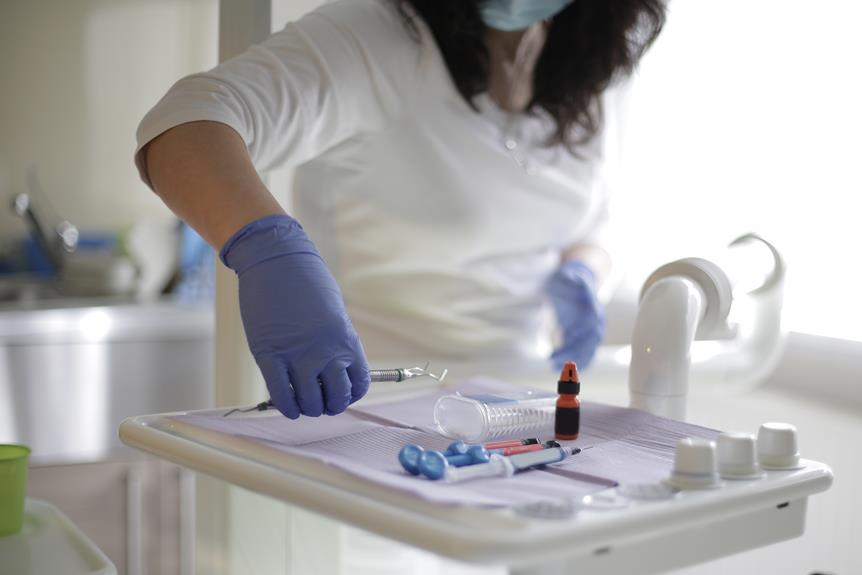What Is Woman Reproductive Surgery Procedures and Recovery

In the realm of women's health, reproductive surgery procedures play a significant role in addressing various conditions and improving overall well-being. From hysterectomy to tubal ligation and ovarian cyst removal, these surgical interventions offer a path towards enhanced reproductive health.
However, the journey doesn't end at the operating table. Navigating the recovery period is equally crucial for a successful outcome.
In this article, we will delve into the different types of reproductive surgery procedures and provide valuable insights on how to navigate the recovery process effectively.
Key Takeaways
- There are various types of reproductive surgery procedures including fertility preservation techniques, endometriosis surgery, hysterectomy, tubal ligation surgery, and ovarian cyst removal.
- Risks and complications of reproductive surgery include infection, hemostasis, organ damage, and scar tissue formation.
- Post-operative pain management for reproductive surgery may involve pain medications, non-pharmacological methods, and personalized pain management plans based on individual patient needs.
- Preparing for reproductive surgery involves preoperative consultations, pre-surgery counseling, emotional support, clear communication, and a comprehensive recovery plan.
Different Types of Reproductive Surgery
In the realm of reproductive surgery, there are various types of procedures that can be performed to address specific reproductive health concerns. Two common types of reproductive surgery are fertility preservation and endometriosis surgery.
Fertility preservation is a procedure designed to protect a woman's ability to have children in the future. It is often performed in cases where a woman is undergoing cancer treatment, as certain cancer treatments can cause infertility. Fertility preservation techniques include egg freezing, embryo freezing, and ovarian tissue freezing.
On the other hand, endometriosis surgery is a procedure performed to remove abnormal tissue growth outside the uterus, known as endometriosis. This condition can cause severe pelvic pain and fertility issues. Endometriosis surgery aims to alleviate symptoms and improve fertility by removing the abnormal tissue.
Both fertility preservation and endometriosis surgery play a crucial role in addressing specific reproductive health concerns and helping women achieve their reproductive goals.
Understanding Hysterectomy Procedures
A thorough understanding of hysterectomy procedures is essential for healthcare professionals in order to provide comprehensive care for women undergoing this surgical intervention.
Hysterectomy is the surgical removal of the uterus and can be performed for various reasons, such as treating conditions like uterine fibroids, endometriosis, or cancer.
After the surgery, women require proper post-surgery care and support to ensure a smooth recovery. This includes monitoring for any complications, managing pain, promoting wound healing, and addressing emotional and psychological needs.
Healthcare professionals play a crucial role in educating patients about the recovery process, providing information on physical activities, dietary modifications, and potential side effects.
Additionally, they should be knowledgeable about resources such as support groups and counseling services that can assist women in coping with the emotional and psychological aspects of hysterectomy recovery.
Exploring Tubal Ligation Surgery
Several studies have shown that tubal ligation surgery is an effective and permanent method of contraception, and it is commonly chosen by women who no longer wish to have children. This procedure involves blocking, sealing, or cutting the fallopian tubes to prevent pregnancy. While tubal ligation surgery is a popular choice, it is important to consider alternative methods and the recovery time associated with this procedure.
Here are four emotional considerations to keep in mind:
- Peace of mind: Tubal ligation surgery provides women with a sense of security, knowing that they have taken control of their reproductive health.
- Empowerment: This procedure empowers women to make decisions about their bodies and future family planning.
- Convenience: Once tubal ligation is performed, there is no need for daily contraception or regular doctor visits.
- Emotional relief: For women who have completed their desired family size, tubal ligation surgery offers relief from the worries of unplanned pregnancies.
Understanding the emotional aspects of tubal ligation surgery, it is important to also explore other reproductive surgeries, such as the process of ovarian cyst removal.
The Process of Ovarian Cyst Removal
The process of ovarian cyst removal, also known as an ovarian cystectomy, involves the surgical removal of cysts that develop on the ovaries. This procedure is typically performed laparoscopically, using small incisions and a camera-guided instrument.
While it is generally considered a safe procedure, there are potential risks and complications associated with ovarian cyst removal, such as infection, bleeding, and damage to surrounding organs.
Additionally, post-operative pain management is an important aspect of recovery, and patients may be prescribed pain medications or advised to use heat therapy or over-the-counter pain relievers.
Surgical Risks and Complications
During the process of ovarian cyst removal, it is imperative for surgeons to be vigilant in identifying and managing potential surgical risks and complications. This ensures optimal surgical outcomes and minimizes long-term effects for patients.
Here are four potential risks and complications that surgeons must be aware of and address:
- Infection: Proper sterilization techniques and post-operative care are crucial to prevent infections, which can lead to further complications and delays in recovery.
- Bleeding: Adequate hemostasis is necessary to control bleeding during the surgery. Excessive bleeding can result in anemia, blood transfusions, and prolong the recovery time.
- Organ damage: Surgeons must carefully navigate the delicate structures surrounding the cyst to avoid inadvertent injury to nearby organs such as the bladder or intestines.
- Adhesions: Formation of scar tissue post-surgery can cause pain and lead to infertility or complications in future surgeries.
Post-Operative Pain Management
Optimal post-operative pain management plays a crucial role in enhancing patient comfort and facilitating a smooth recovery process following ovarian cyst removal surgery.
Post-operative pain is a common concern for patients undergoing any surgical procedure, and effective pain management strategies are essential to ensure the best possible outcomes.
There are various approaches to managing post-operative pain, including the use of pain medications, such as opioids and non-steroidal anti-inflammatory drugs (NSAIDs), as well as non-pharmacological methods like relaxation techniques and acupuncture.
Additionally, personalized pain management plans should be developed based on individual patient needs and preferences. It is important to consider factors such as the severity of pain, potential side effects of pain medications, and the patient's overall health status.
Preparing for Reproductive Surgery
Preoperative consultations with a reproductive surgeon can provide valuable insights and recommendations for patients preparing for reproductive surgery. It is crucial to have pre surgery counseling to educate patients about the procedure and address any concerns or fears they may have.
Here are four emotional insights and recommendations that can help patients prepare for reproductive surgery:
- Emotional support: Offer patients a safe space to express their feelings and fears about the surgery. Provide them with resources for emotional support, such as counseling services or support groups.
- Clear communication: Ensure that patients fully understand the procedure, including the potential risks and benefits. Use clear and empathetic language to address their questions and concerns.
- Post-surgery recovery plan: Discuss post surgery complications and provide patients with a comprehensive recovery plan. This will give them peace of mind and help facilitate a smooth recovery process.
- Holistic care: Emphasize the importance of self-care and overall well-being. Encourage patients to engage in activities that promote physical and emotional healing, such as gentle exercise, proper nutrition, and stress management techniques.
How can patients effectively manage their recovery period after undergoing reproductive surgery? Managing the recovery period after reproductive surgery is crucial for patients' overall well-being and long-term effects. It is essential to focus not only on the physical aspect but also on managing emotional well-being. Taking care of oneself mentally and emotionally can greatly contribute to a successful recovery. Here are some strategies patients can consider:
| Strategies | Benefits |
|---|---|
| Rest and relaxation | Promotes healing and reduces stress |
| Proper nutrition and hydration | Supports the body's recovery process |
| Gentle exercise and physical therapy | Enhances circulation and mobility |
| Seeking emotional support and counseling | Helps manage emotional well-being |
Tips for a Successful Recovery
In order to achieve a successful recovery after reproductive surgery, patients can implement various strategies and follow these tips for a smoother transition towards their long-term well-being:
- Stay on top of pain management: Post-operative pain can be managed effectively with the guidance of your healthcare team. Follow their instructions for pain medication and use relaxation techniques like deep breathing or meditation to help alleviate discomfort.
- Prioritize rest and relaxation: Give yourself permission to rest and recover. Take time off work, enlist the help of loved ones for household chores, and indulge in activities that promote relaxation and self-care.
- Follow a healthy diet: Nourishing your body with nutritious foods can aid in the healing process. Incorporate fruits, vegetables, lean proteins, and whole grains into your meals to support optimal recovery.
- Seek emotional support: Going through reproductive surgery can be emotionally challenging. Reach out to friends, family, or support groups to share your feelings and seek guidance during this time.
Frequently Asked Questions
How Long Does the Recovery Period Typically Last After Reproductive Surgery?
The recovery period after reproductive surgery varies depending on the specific procedure and individual factors. It typically lasts several weeks to a few months. Post-operative care, including rest, medication, and follow-up appointments, is crucial for a successful recovery.
Can Reproductive Surgery Affect a Woman's Fertility?
Reproductive surgery can have long-term implications on a woman's fertility, potentially affecting her ability to conceive naturally. Fertility preservation techniques may be recommended to mitigate the risk and increase chances of successful pregnancy post-surgery.
Are There Any Alternative Treatments or Procedures to Reproductive Surgery?
Alternative treatments and non-surgical options can be considered as alternatives to reproductive surgery. These options aim to address reproductive concerns without invasive procedures, offering potential solutions while minimizing the risks and recovery time associated with surgery.
What Are the Potential Risks and Complications Associated With Reproductive Surgery?
Potential risks and complications associated with reproductive surgery include infection, bleeding, organ damage, and anesthesia-related complications. The recovery period may vary depending on the specific procedure, but patients are typically advised to avoid strenuous activities and exercise during this time. It is important to consider alternative treatments and discuss potential impacts on fertility.
How Soon Can a Woman Resume Normal Activities and Exercise After Undergoing Reproductive Surgery?
After undergoing reproductive surgery, it is important for a woman to allow herself adequate time for post-surgery recovery. The duration of this recovery period varies depending on the individual and the specific procedure performed.








